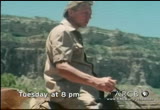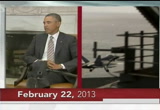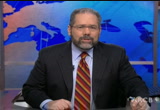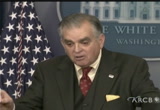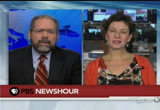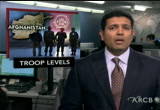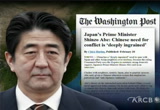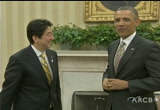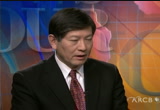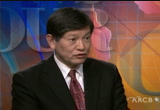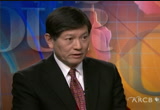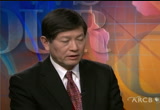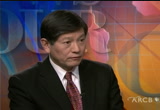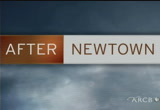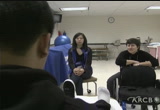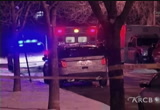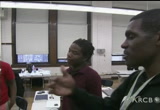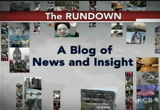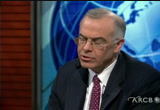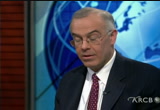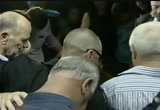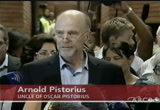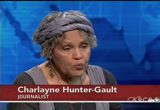tv PBS News Hour PBS February 22, 2013 5:30pm-6:30pm PST
5:32 pm
captioning sponsored by macneil/lehrer productions >> woodruff: the united states' top transportation official warned today that automatic government spending cuts would severely disrupt the nation's air travel system. good evening, i'm judy woodruff. >> suarez: and i'm ray suarez. on the "newshour" tonight, "washington post" reporter lisa rain walks us through the reality and the hype surrounding the timing and impact of sequestration, as the countdown for a deal enters its final wee >> woodruff: then, margaret warner looks at today's summit between president obama and japanese prime minister abe, where japan's tensions with china were very much in the forefront. >> suarez: our week long focus on guns, "after newtown" wraps
5:33 pm
up tonight with a report from chicago on the public health crisis in the city in the wake of rising gun violence. >> the people who come in after having been shot are some of the highest risk folks. these are people who have been shot, who may have been shot before, and really without some intervention, without some life- changing moment, the trajectory's either going to be jail or death. >> woodruff: mark shields and david brooks analyze the week's news. >> suarez: and, as a magistrate grants oscar pistorius bail, we talk to charlayne hunter gault about how his arrest has focused attention on the unusually high rate of violence against women in south africa. >> domestic violence is shot through the entire society from the highest of the highed in socioeconomic terms to the lowest of the low. >> woodruff: that's all ahead on tonight's "newshour." >> major funding for the pbs newshour has been provided by:
5:34 pm
>> support also comes from carnegie corporation of new york, a foundation created to do what andrew carnegie called "real and permanent good." celebrating 100 years of philanthropy at carnegie.org. >> and with the ongoing support of these institutions and foundations. and... and friends of the newshour. >> this program was made possible by the corporation for public broadcasting. and by contributions to your pbs station from viewers like you. thank you. >> suarez: with just a week left before automatic spending cuts are set to begin, the obama administration stepped up pressure on republicans in congress today. the latest warnings came over the potential impact that furloughs would have on air
5:35 pm
trav, starng in apl. transportation secretary ray lahood said travelers could face new delays of 90 minutes at major airports in chicago, new york and san francisco. more than 100 air control towers at smaller airports could be closed, lahood said. airlines likely would cancel flights. and congress, he said, would hear of the fallout. >> it's not only the impact on the passengers, it's the impact that it has on airports, control towers, people who work there, airports. and their ones are going to start ringing. why does this have to happen? nobody likes a delay. nobody likes waiting in line. none of us do. if we can't get our hamburger within five minutes, if we can't get on the plane whin 30, 40, 50 minutes after going through, you know what happens. they start calling their
5:36 pm
member of congress. >> suarez: more now on these latest warnings, the republican response and the timing of these possible cuts. lisa rein is following this for the "washington post" and she joins me now. lisa, in recent days senior members of the obama administration have laid out an exacting detail all the terrible consequences that the sequester goes through while republicans, in many cases, have said it might not be that bad. from your reporting, can you tell who's working closer to the truth? >> well, it is hard to tell you about this is really in part a political game because it really does look like these 85 billion dollars in snding cuts will begin to take effect next fridayment it does not look as if congress, either side in congress has a real terest in resolving this issue. and the obama administration has over the past, i'm going to say, about two weeks has
5:37 pm
stepped up the pressure on republicans to say to the public, okay, dire consequences will result if these cuts take effect. that's in part because the agencies have to make the cuts across-the-board and they can't really make them without furloughs. now air traffic is just one area of the government that would-- that the white house says would be impacted. you've got national parks that are going to delay openings because they have to-- they can't do seasonal hiring and seasonal hiring are the folks who really drive parks. poultry inspections would be compromised. prosecutions in federal courts, you know, would be affected. the whole range of things. now for the obama folks, in many ways it's in their interest to blame republicans for these cuts because polls have showed that the republicans would take the blame. for republicans, many, many constituents in these republican districts want to
5:38 pm
cut government spending. and their members feel that this is really the only way to start doing it. >> suarez: these are being portrayed as sudden and sizable cuts. where are they going to be seen first. secretary lahood was talking about april for some of these air traffic affects. what will we see and how soon after march 1st? >> well, it's hard to say. there's no question that no one is going to be furloughed next friday. and the cuts will really not be visible for several weeks if that. it's also possible that congress will reach a deal several weeks into these cuts to stop them. and nothing really noticeable, you know, would happen to government services. so they will be gradual and federal agencies have the ability to push off some of the cuts. but what they are saying is that they need to start furloughing people in about april. the defense, the pentagon says this week that it was issuing furlough notices to
5:39 pm
about 800,000 civilian employees. to prepare to be furloughed. so in the case of the pentagon, you know, that means that destroyers, various aircraft carriers will not deploy to places like the persian gulf and other theatre, and that's a big effect on local economies, in areas like rampton rode, virginia, san diego. and it's an effect affect that will be clearly felt on contractors who ry on navy contracts for shipbuildings. so i think the affects will be gradual. no one can really tell when the agencies will sort of pull the plug. and as i said, the cuts nay not take effect for that long. >> suarez: you said at the outset there is a political dimension to this. of course as we enter the final week there most certainly is what is the they are telling opinion researchers if friday comes and goes without a deal? >> well, i think part of the problem is that many
5:40 pm
americans don't really understand what sequestration is. it's become this obsession in washington. but many people are only just now beginning to become aware of it. but the recent, a recent poll by the pew center for research said that many more republicans would be held responsible than would the obama administration. on the other hand, as i said earlier, republicans have been putting pressure on the administration for two years, three years now, to get to make deep spending cuts to the federal government which they see as excessive and in need of cutting and as causing huge deficit problems. and part of the problem is if you have automatic spending cuts which is what the sequestration would do across all arms of the government, virtually, then no one really needs to take responsible for having authorized specific cuts to specific agencies. and that's in part why the
5:41 pm
cuts are oddly enough politically more palatable than if republicans or democrats were to say, okay, we suggest that you cut this agency, or that agency. >> suarez: lisa rein of the "washington post", thanks for joining us. >> thank you. >> woodruff: still to come on the "newshour": china concerns at the u.s.-japan summit; a public health crisis linked to gun violence; shields and brooks and violence against women in south africa. but first, the other news of the day. here's hari sreenivasan. >> sreenivasan: a winter storm headed east today, after socking the plains with snow, sleet and freezing rain. it was already blamed for four deaths, flight disruptions and hundreds of road accidents. the huge system was moving north and east, and losing some of its punch. but it was still expected to make trouble in the northeast and new england this weekend. the sounds of snowblowers roaring to life and shovels scraping the driveway could be heard in state after state today. much of the nation's mid-section spent the day digging out from
5:42 pm
more than a foot of snow and for drivers, it quickly turned into an icy nightmare. the highly unsettled storm also brought lightning and thunder, but it was the snow falling at two inches an hour in places that caused the worst problems. kansas city mayor sly james said it was the pace that was hard to deal with. >> it fell fast, it fell heavy and it fell at the wrong time. you know it started in the morning around rush hour and just continued until about 2:00 p.m. >> sreenivasan: the mayor said kansas city's main streets had been cleared by midday, and crews worked on residential neighborhoods. but yesterday, it was a far different story: this kansas city bus couldn't navigate the drifting snow and fishtailed into a lamp post. the snow came with high winds that piled up large drifts. and that, in turn, caused problems on the interstates. >> man, it's kind of tough out here even if you got a four
5:43 pm
wheel drive i advise you to stay in because everybody's getting stuck all over the place. it's a mess out here. >> sreenivasan: crews worked through the night and into today in missouri and kansas to plough i-70. 200 miles of the highway in kansas had been shut down as the storm blew through. today as the system tracked north and east, it created more travel woes. a united airlines plane skidded off the runway in cleveland, in icy conditions. no injuries were reported. nato defense ministers discussed plans today for keeping 8,000 to 12,000 foreign troops in afghanistan beyond 2014. that's when international combat forces are scheduled to withdraw. those remaining would focus mostly on training afghan units. in brussels, u.s. defense secretary leon panetta said it's unclear how many americans would be part of that longer-term force. >> we want to be able to have the flexibility to look at a range of options that we ought to have for our enduring
5:44 pm
presence but i want to make very clear that the range of options we were discussing was with regards to the nato force and the nato force consists of both a u.s. presence plus nato contributions. >> sreenivasan: some 66,000 u.s. troops are currently stationed in afghanistan. in egypt, a general strike in the city of port said entered a sixth day, with major new protests. thousands of people rallied in the streets waving signs and chanting slogans demanding that president mohammed morsi step down. they also denounced his call for new elections, beginning in april. >> ( translated ): morsi's call for parliamentary elections is null. i want to give a message to morsi who is a representative of the muslim brotherhood group. i want to tell him that port said is the one that will get rid of this regime. we have started this revolution and we started our strike. we do not fear them. >> sreenivasan: one opposition leader mohammed el-baradei said holding elections amid the current upheaval is a recipe for disaster. his group threatened a boycott of any vote unless morsi first
5:45 pm
agrees to political talks. th stas ofexas and georgia executed two men last night, by lethal injection. carl blue was put to death in texas for dousing his girlfriend with gasoline and setting her on fire in 1994. she died later. and in georgia, andrew allen cook was executed for killing two college students in 1995. a second death row inmate in georgia had been scheduled to die this week, but his attorneys argued he is mentally disabled, and won a stay. the food and drug administration approved a first-of-its kind breast cancer drug today. the medication named kadcyla attacks tumor cells without harming healthy ones. studies by the drug's maker roche found it delays the progress of breast cancer by several months. the f.d.a. approved its use for patients with an advanced form of the disease that's more aggressive. wall street closed out a volatile week with a big day. the dow jones industrial average gained nearly 120 points to close just over 14,000, making up most of the lost ground of the last two days. the nasdaq rose 30 points to close well above 3,161.
5:46 pm
for the week, the dow gained a fraction of 1%. the nasdaq fell nearly 1%. those are some of the day's major stories. now, back to judy. >> woodruff: u.s. and japanese leaders met today at the white house. one major topic was how to deal with an increasingly assertive china. margaret warner has the story. >> warner: for prime minister shinzo abe, just two months in office, this visit to washington was an early opportunity to emphasize japan's alliance with the united states. and at the white house today, he heard welcome words from president obama. >> obviously, japan is one of and the u.s. japan alliance is the central foundation for our regional security. and so much of what we do in the pacific region. >> warner: the u.s. has a robust trading relationship with japan, and some 50,000 troops stationed there since the end of world war ii. and now both nations face the challenge of dealing with
5:47 pm
a rising china, and its new leader, xi jinping. but u.s. officials are growing concerned about the rising tensions between china and japan. the most recent flare-up hs come in the east china sea over control of some small uninhabited islands known as the diaoyu in china and senkaku in japan. they lie near critical shipping lanes, fishing grounds and gas deposits. ships from both countries patrol the waters there and japan recently scrambled fighter jets when chinese planes entered air space nearby. the dispute has stirred public passions too. large protests in china last fall targeted japanese embassies and businesses. in a "washington post" interview before this trip, abe said china's communist rulers are using the dispute to shore up domestic support. he warned they will "not be able to change the rules or take away somebody's territorial water or territory by coercion or intimidation."
5:48 pm
in beijing today, china's foreign ministry spokesman rejected those comments. >> ( translated ): china conducts normal maritime activities according to our domestic and international law. there is nothing to object to on that. japan must have a hidden agenda by hyping up a china threat, misleading international opinion, and purposely creating regional tension. >> warner: at the white house, abe sounded a somewhat more restrained note, speaking through a translator. >> i also explained that we have always been dealing with this issue, the senkaku issue, in a calm manner. we will continue to do so and we have always done so. >> sreenivasan: the two leaders also agreed to stand together against north korea's nuclear provocations. and to pursue even closer economic cooperation, which abe needs as he tries to revive a long-stagnant economy. to explore this flare-up between japan and china and the stakes for the u.s., we turn to mike mochizuki,
5:49 pm
associate dean of the elliott school of international affairs at george washington university. his upcoming book is "the new strategic triangle: the u.s.- japan alliance and the rise of china." welcome back to the program. >> thank you. >> warner: so first of all, how serious is this escalation of tensions between china and japan, these two neighbors? >> well, it is serious. but it's not like the two sides are on the verge of havg some kind of shooting war er these uninhabited islands. but every week there's been a racheting up of the tensions. china has been escalating its patrols near these disputed islands and the japanese are resisting. and so the real danger is that there will be some unintentional accident, a collision, that then could lead to a loss of life and then that could really feel a nationalistic backlash in china and really lead to
5:50 pm
tensions. and then this could draw in the united states into an unwanted conflict. >> are you saying that it could happen then through miscalculation rather than deliberate intent on the part of either country? >> yes, through miscalculation or accident. i mean it's very unfortunate that now you have fighter jets coming close and then also almost on a daily basis there are face-offs between the japan coast guard and various marine surveillance vessels from china. now so far it's good that the chinese navy and the japanese navy are really far apart. but even recently there have been reports that a chinese naval ship had locked in a fire control radar and this was seen as a very aggressive act by the
5:51 pm
japanese. >> so what is driving this? >> well -- >> at its root. >> well, i think there are a couple of things. one is the power transition that's going on in the region. japan used to be the most powerful economy in the region but china has grown, a lot of it is due to the help that japan has given it. but now china feels that its day has returned. >> and in fact it surpassed japan just in economic test. >> that's right. and it is now building up a military capable which is still interior to that of japan. and definitely inper-- inferior to that of the united states but they feel now that china can't be pushed aroundment and they want to assert themselves. and so when their territorial interests are being challenged, then they push very hard. the other reason is-- . >> warner: were you talking about japan or china. >> china. >> warner: and what about japan? >> then japan feels that it
5:52 pm
is on the defensive. that if it does not show kind of firmness and resolve, then it invites further intimidation and bullying on the part of china. so even though the intrendic interests of these islands may be marchial by giving in to chinese intimidation, they feel then that that is kind of rewards that bullying on the part of china. >> warner: there s of course, these unresolved nationalistic feelings, conflicts dating back to world war ii. are the-- how deep is that, are the leaders, is the leadership in each country scanning that and if so why. >> i thk in the past there might have been part of that on the part of chinese leadership, using the so-called history card against the japanese. but i think that that has shifted. and now that the chinese
5:53 pm
leadership are in a sense prisoners of the nationalism that they mobilized. >> warner: let's get to the u.s. because they mentioned the danger the u.s. could get drawn into. what are the stake force the united states, first of all, and how likely is it that the u.s. given its security guarantee to japan could get, in fact, drawn in if they had a military consult. >> well, i think the big stake is that there is enough problems in relations between the united states and china that this adds one more issue. but there is a real danger because we have a security commitment to japan. that if there is a conflict, then we would have to get involved. and so you know we have a very difficult, delicate balancing act and i think so far we're playing it just right. >> warner: what has the administration done to try to calm things? >> right, well, first of all, it has backed japan and so this is a way of deterring china but the other is it sent high officials and ex-officials to china and
5:54 pm
japan to say, we have an interest and deescalation. we want to support further communication between japan and china, but we refrain from playing a mediating role between these two countries. >> well, much mo watch. thank you very much. >> suarez: we conclude our weeklong series on guns, violence and mental health concerns in the wake of the connecticut shootings. tonight, we have a report from chicago on how doctors and researchers there are trying to tackle the growing problem of gun violence as a public health issue. our story is part of pbs's "after newtown" project and was filed by elizabeth brackett of wttw chicago. >> reporter: not yet two months into 2013 and the death rate from gun violence in chicago has exceeded what it was this time
5:55 pm
last year and last year's numbers were awful. 506 total murders in 2012. 16% higher than the previous year. there was shirley chambers who lost her fourth child to gun violence in january when a gunman opened fire on a van with her son inside. there was 15-year-old hadyia pendelton who had just returned from president obama's inauguration with her high school band. >> thank you it's not unique to chicago, not unique to this country. too many of our children are being taken away from us. >> swing your legs over to the side here. >> but but death tolls don't tell the whole story.
5:56 pm
>> you're already wearing your prosthesis? >> reporter: dr. michelle gittler who treats survivors of gun injury at chicago's schwab rehabilitation hospital says gun violence has become a public health crisis. many big city medical professionals who see victims every day, gittler welcomes the new attention lawmakers are giving the issue after connecticut's sandy hook elementary school massacre. >> that kind of tragedy, that's not the problem that were really talking about. i mean it's catastrophic that 36 people died, but 31,000 people die every year of firearm violence. >> reporter: an expert in spinal cord injury and paralysis, gittler works with patients like this 17-year-old high school student who was shot multiple times while walking in his neighborhood. his mother doesn't want us to show his face for fear the shooter, who was never caught, may try to hurt him again. >> the individuals that i deal with have a disability, at the the first thing is they've lived, so that's good, but then
5:57 pm
they realize this isn't going away, so you're trying to enable them to resume as much independence as possible. it'll be different, but really the hardest part is getting them back home, getting them right back to where the injury occurred in the first place. if they don't feel safe, then if they don't go to school, what are they going to do for the rest of their life? >> reporter: gittler says the costs to the health care system are enormous. she sites rehabilitation, social security disability, and emotional trauma. the centers for disease control estimates the medical and work loss costs from firearm death and injury at more than $68 billion. >> it's dollars we are talking about, what their earnings could be, and what they are getting from s.s.d.i., but you know, i would think that as a public
5:58 pm
with a conscience, we care that individuals have disabilities that could be prevented. >> reporter: gittler wants the focus shifted to prevention. and thinks a public health approach will do just that. she lauds president obama's recent executive order directing the centers for disease control to research the causes and prevention of gun violence. >> it's like understanding any disease, whether we're talking about diabetes that affects different populations, or breast cancer that affects different populations, until we had the research that showed us how we addressed those populations, we didn't understand how to treat the diseases. >> reporter: since the mid 1990s, the center for disease control congress has been forbidden to research it because gun rights advocates said it was a way to push gun controls. shaun kranish who lives in rockford illinois sees chicago's
5:59 pm
violence is a huge problem-- one that deserves attention and funding, but kranish believes isolating guns is politically motivated. >> i really look at violence as violence no matter what object or tool or method is employed. we do have a violence problem in this country, but it is a complex issue. this whole discussion is really just centered around trying to bring some legitimacy to the idea of prohibiting guns, despite the fact that access to firearms is a guaranteed right as a free society. >> reporter: those who view gun violence as a public health issue focus as much or more on pro-active intervention as they do on reactive treatment. dr. marie crandall is a trauma surgeon at northwestern memorial hospital. >> the people who come in after having been shot are some of the highest risk folks. these are people who have been shot, who may have been shot
6:00 pm
before, and really without some intervention, without some life- changing moment, the trajectory's either going to jail or death. >> reporter: dr. crandall wants to change that. >> i felt like patching people up and sending them back on the street was similar to taking care of someone after a heart attack without treating the underlying hypertension that lead to their heart attack in the first place. unfortunately, there are no easy or quick solutions to violence like a beta blocker for hypertension. but it definitely lead me to want to do more. >> reporter: with crandall help, the hospitals trauma unit has recently developed a new protocol, now when a gun shot victim arrives at the hospital, community baseviolence mediators are immediately called in. crandall likens it to prescribing medication. >> we at northwestern, partnered with community organizations to help really bring care to our patients that would be similar to a beta blocker for heart disease. >> reporter: it is a similar story for pediatrician karen sheehan at chicago's lurie
6:01 pm
children's hospital. >> i became a pediatrician because i wanted children to reach their full potential so they could do whatever they wanted to be. but if you live in chicago, that's not going to happen for many of our children because of the amount of community violence we have. do you have a gun in the house? >> reporter: sheehan looks at health issues beyond just gun shot wounds. >> we have not fully appreciated the effects of violence on the whole health of the population. it's limiting just to think of it just from the injury point of view. >> reporter: many of her conversations with families center around healthy and safe lifestyle choices. >> i think even more than the direct physical effects of violence is people are experiencing the stress of living in these communities with high rates of violence. so it changes their other behaviors. so now they're afraid to exercise or they're afraid to go to the store to get health foods it contributes to diabetes and heart diseases because it limits how you feel in your community.
6:02 pm
>> reporter: the vast majority of chicago's gun related homicides are concentrated in just a few neighborhoods on the city's south and west sides. gun violence is the leading cause of death for african american males ages 15-24. at harper high school in the southside neighborhood of englewood, 27 current or former students were shot in 2012 alone. eight died. trying to make sense of why kids here are so vulnerable, academics from the university of chicago's crime lab are studying harper's students through the lens of public health. the researchers chose males with a high risk index-- poor grades and poor attendance records-- and placed them in a clinical trial. >> we identify 2,700 kids and 2,700 boys grade 7-10 living in
6:03 pm
a variety of south and west side chicago neighborhoods. like in medicine, we randomly assigned some to get program services and some to be a control group. >> reporter: the program is called becoming a man or bamand >> it can be very uncomfortable to do the right thing, but if we practice doing the right thing in this circle where it's safe. >> reporter: results from 2009- 2010 clinical trials showed a dramatic difference in students who received bam counseling and students in the control group who did not. >> one year of bam participation reduces the rate at which kids are arrested for violent crimes by fully 44%. that is an enormous reduction. >> reporter: ludwig says that this kind of empical data is critical. >> i think one of the key
6:04 pm
characteristics of the public health approach, besides its reliance on data and rigorous evaluation using clinical trials, like in medicine, is to try to be more preventive to think, what can we do for kids who are on trajectories that might lead to some sort of bad outcome, what can we do to help them and divert them onto a more pro-social trajectory, before something really unfortunate happens. >> reporter: for sophomore levelle morgan the bam program is about much more than statistics, it's about life and death choices. do you rry about living until you're 40? >> yes, i would love to live to >> reporter: and what do you think your odds are? >> that i will eventually get shot, but i try to stay away from gangbanging as i can. >> reporter: as lawmakers debate what to do about gun violence these next few months, the medical community here and across the country is likely to weigh in.
6:05 pm
>> suarez: online, we have a look at how some schools are teaching therapy and stress management. in appalachian ohio, educators say their students are learning to change the way they think about negative things in their lives, before they turn to violence. our weeklong series wraps up tonight, but you can find links on our website to our previous stories. and we'll be following the issues and debates closely in the months ahead. pbs's "after newtown" series also concludes tonight with a "need to know" report on the continued impact of one school ooting 20 years later. and washington week also takes up the gun violence story this evening. check your local listings for both programs. >> woodruff: and to the analysis of shields and brooks syndicated columnist mark shields and new york times columnist david brooks.
6:06 pm
welcome, gentlemen. so as we just heard, pbs the newshour focusing all this week on gun violence, on mental illness. we just saw that report from chicago on an effort to work with students. david, it really does again come down to what can be done about it. and in the middle of all this, people are still looking to washington, gun control laws. where does it stand right now? >> i would say if one has realistic expectation force the political system, the news is reasonably good, you know, obviously it is a very polarizing issue. but i do think the sides are trying to find some sort of progress that can be made. so if you look at the stuff that's likely to get through the system, likely to have some background checks. we're likely to have at least possible to have some magazine controls, there is a lot of talk insurance, liblingt insurance for gun owners. that's more a state thing. there's also more prosecutorial things that are being talked about and proposed, making it hard for fell ons to get guns. controlling some of the transfers.
6:07 pm
youthful offenders. so these are not huge things, probably not assault weapons ban but a series of small things to make the friction of gun ownership more difficult. i still have to say though and i have said this a lot that when you look at some of the acts of gun violence, people shot in chicago, often it's handguns and there's really very little being done on some of the, what really is the heart of the problem. >> can something be done about that? >> well, first of all, let me just say that pbs deserves credit. i just hope that the other networks would emulate and compete. i mean it's been a really important week, i think. and i think there has been this time an effort, a real effort to sustain the sense of hurt, outrage and los of newtown. "slate" magazine has a running total of the number of people who have been victims of gun violence since december 14th in
6:08 pm
newtown. now at 20 -- 2,124 since then. i think the efforts of those in positions of leadership, vice president biden in particular, i agree with david. i think there's a chance, i think we'll get university background checks. >> woodruff: dow. >> i do believe that. i think that fit of all, judy, most encouraging thing is nobody is going to filibuster this. we're going to have votes. i think you will be in a position politically it would be indefensible not to have votes up or down. i think both sides really, i think the president put that very well in the state of the union. >> woodruff: one house committee chair said that they were going to -- >> the chairman of the house judiciary committee who is himself not an advocate of gun control. but i think limiting the size of the magazine. and i think as well, that there is a real chance for tougher penalties against straw buyers who are one of the real problems in guns. that virginia has-- so i
6:09 pm
think the most encouraging thing to me is we are focused on achievable goals. i'm hopeful on the assault weapon ban, i really am. an i am more encouraged than i have been in the past. >> hopeful on the assault weapon ban,. >> no, i don't think so i think that would be too heavy a lift. i think there's a lot of opposition. >> but on background checks. >> yeah, i think that. and you can see they're doing a good job. the administration i would say is doing a good job, first every time they talk about guns they praise hunters, they talk about second amendment rights and they have taken it out of what had become, which is a cultural issue, urban versus rural, more or less, and they sort of tamped that down. focused on the practicalment i wish they would take that approach in some other spheres of our politics. >> you both are saying you think the administration a that there is at least a conversation going that could lead to legislation. >> i do. i think we'll get votes in the congress which in the past has been a problem. >> and it should be
6:10 pm
emphasized, though, that social policy has its limits. there'just not much history of gun violence or gun control limiting crime. it does, can limit suicide but limiting some of the violence, it's just not a great record. that's like a lot of social policy. you can have modest progress but not something transformational am i would think to get the effects in those chicago schools you have to have much broader social policy, you know, families, poverty, all the stuff we talked about. >> i agree but that was a good part of that discussion was about impulse control. and dealing with that. and those impulses are easy to control if there aren't firearms. >> well, the terrible word, sequester, i don't know who chose the word but a week from today, mark, we are going to see the beginning unless something changes between now and then of automatic, across-the-board federal spending cuts, $85 billion dollars worth. do you see anything
6:11 pm
happening between now and then to stop this from at least the clock from ticking? >> no, i sure don't, judy, grantland rice said when the great scorer comes right beside your name, it's not whether you won or loss but how you played the game. this has been changed, he write not whether you won or lost but without et goes the blame, that is what we into now in washington. if this were really serious or a matter of national urgency, last weekend would to the have been spent golfing in florida and the congress out of session. i mean there would have been meeting. there would have been, you know, serious negotiations. and i think the democrats playing the fact that the president has a political advantage. he is seen as the more responsible of the two parties. the republicans are very much on the defensive but i don't see in answer to your question i don't see a resolution or a solution. >> do you see any movement? >> no, there were a couple of phone calls yesterday but that's about it, just phone callsment i certainly don't see any movement.
6:12 pm
as mark said the polls show the democrats will probably profit. the republicans still feel frapd. they feel they gave up a big tax increase a couple weeks ago and they can't give up another. and that's sort of the asking price so they feel they have to show they can cut spendingment i personally think the likely loser in this is the republicans. they're less popular. they're associated with governments controlling government spending. and they have basically got a problem. i think they need to show the american people that we like some government programs. we don't like others. they need to be able to distinguish between the two. unfortunately when they embrace this, they are embracing a piece of legislation that make those distinction between good government and bad government testimony just cuts randomly across-the-board and worse, done even cut the things that actually create the debt problem which is the entitlement programs. so to me this is both substantive and political serious problem for repubcans. >> are you saying they're going to have to move off their position. no revenue increases. >> the republicans have been doing this since 1995, since the government shutdown. they make a big show. they tell themselves we're
6:13 pm
going to control spending. they do something sort of hand fisted. and it, when the public reaction, then they cave in and they come with concessions. so it's not like we have been here before. i just wish they had a smarter strategy. if i could give one piece of advice is don't worry about discretionary spending. when you are talking about cutting government, national health and tsa, that's small potatoes. they're always focused on that which is sort of the sympathetic popular stuff forbes cuss on the entitlement programs, but they areoff doing the wrong thing. >> woodruff: are you going to disagree. >> i have to disagree with david, that's in the contract. no, i think the republicans, you can see where they arement they are very much behind the political eight ball. they are now saying, they're reduced to saying well, the cuts aren't going to be that serious. the democrats are exaggerating them. even though they were warned about these cuts were terrible and defense now they're not going to be that seriousment and now it was also the president's idea. to begin with.
6:14 pm
i mean that seems to be their fallback position. >> but we're hearing today about the air-traffic controllers. >> secretary lahood was out there. >> food inspections. >> that has been the obviously the administration's position that this is going to be very serious. it's going to inconvenience people and it's going to inconvenience travelers. and there is a potential threat to the economy. $800,000 jobs has been predicted is the loss by congress budget office. we're talking about serious implications. and but i don't see, judy, i mean i recall in 1990 when george h.w. bush was president, and we went to andrew os air force base for five weeks with the leadership of the congress and the leadership of the white house and dick-- and john sununu and the president was involved and bob dole, you know, it was just really a major thing. i don't see anything
6:15 pm
approaching that since those urgency engagement or involvement at this point. >> woodruff: why not? >> i think in the democrats, i think the president feels that he's got the upper hand, the advantage on it. i think that his position is stronger, it's more popular. he thinks its more defensible and most people would agree with him. and he's got the republicans very much, if not at his mercy than certainly at a disadvantage. >> they both like it secretly. there are democrats it's going to be probably a political win. i think they know substantively it's a disaster. sequestration was designed to be stupid so it wouldn't happen and succeeds magnificently at being stupid it is really stupid policy. it's a political win for the democrats, so that recall so of a silver lining. and for republicans they can show people who sort of think they're week, hey, we're tough, we're cutting government. so if you look at the conservative press, not all the weekly standards, some others have said this is a bad idea. but others have said you
6:16 pm
know, we're going to cut spending. let's learn to love it. >> woodruff: just a matter of time. >> it was. it was intended as a nuclear option. i mean, it was so irresponsible and so indefensible that it would never come to pass. and on the first of march it will come to pass. >> woodruff: less than two minutes but i want to bring up immigration reform. another big subject out there. last weekend there was information about the administration's proposal on immigration. it was, republicans say the administration david leaked it on purpose. democrats say they didn't. i mean what do you see happening on immigration. just -- >> i say this is more like the gun issue than sequestration some people are behaving reasonably well. that leak came out, people sort of put it aside and said the senate is still working. the members on both sides of the issues are working together. even labor unions in the chamber and business group are sort of working together. so i would say there is significant steady forward progress toward a bill that
6:17 pm
without provide a path to citizenship that would get us the high skilled workers. i still think this is marching along reasonably well. >> what do you see. >> some republicans lead by ted cruz, the junior center from texas charged that this was an attempt by the white house to sabotage the immigration bill. in hopes that it would be a political advantage for the democrats in 2014 and 2016. you know, i don't think that's true. i mean i think it's in both party's interestsment i think it's in the president's legacy to resolve the immigration in the past, a significant historic statue. i think it's in the republican's interest to pass a law that at least enables them to start to compete and campaign for hispanic votes in the future. >> woodruff: both of you see some movement here. all right. we hate to ask you to move off the set but it is the end of our time. david brooks, mark shields, thank you. >> and mark and david keep up the talk on the doubleheader recorded in our newsroom. that will be posted at the top of the rundown later
6:18 pm
tonight. >> suarez: finally tonight, the oscar pistorius story. the south african double-amputee athlete accused of murdering his girl friend was released today on bail. the case has captured international attention. we begin with a report from rohit kachroo of independent television news in pretoria. >> reporter: moments after the judgement, the brother and sister of oscar pistorius embraced. their father seemed overcome with the news that his son would soon be freed from custody. for four days this courtroom has been a theatre for this unfolding drama. for them a stage for public pain. but their response to the ruling was to stand, to link arms, and to pray. pistorius was here seeking bail, accused of the
6:19 pm
premeditated murder of his girlfriend reeva steenkamp. he sorbed as the events were outlined. his lawyer whispered you're going to be okay. thank you, sir, the response. then later the judgement was delivered. followed by celebration from his supporters. >> i have come to the conclusion that the accused has made a case to be released on bail. >> reporter: the magistrate ruled that the state witness was weak and oscar pistorius presented no flight risk. then speaking on behalf of his family, oscar's uncle told of their relief. >> we know that is the truth and that will prevail in the coming court cases. >> yes, we are relieved. the fact that oscar got bail today. but at the same time, we are
6:20 pm
in mourning for 9 death of eeva with her family. >> reporter: but as his brother left, his elation seemed to fade. there is a long road ahead, he concede. and that journey began on the streets of pretoria as pistorius was driven from court into the suburbs. glimpsed briefly after the conditions of his bail were agreed. will stay with a friend and will return to court in june. >> there's >> suarez: there's no proof of domestic violence in the pistorius case, at least not at this point. buthe killing of reeva steeamp hafocused attention on violence against women in south africa. we take a look at that problem with charlayne hunter gault. she was a correspondent here at the newshour for many years and then lived in south africa working as a journalist for more than a decade. welcome back. >> thank you. >> suarez: it's a remind other of just how much jeopardy women and children are in in south africa. >> it's a horrendous story.
6:21 pm
this is a sad story in so many ways. but what this murder has done is to shed light on the hugh money guess problem of domestic violence, and in particular-- murder of an intimate partner. there are so many cases that happen on a daily bases that don't even get reported because so many of them that have been reported have just been thrown out of court. the numbers are astounding. and so people get discouraged. they don't-- they don't report those cases because there is just no real justice for women at this point. >> suarez: the world health organization says 60,000 women and children are victims of domestic violence eve month. a new piece of research from south africa, by south african scholars has one out of four men admitting they committed rape in the past. has it always been this way? >> it's been this way for a long time. and it goes across-the-board.
6:22 pm
it's not the peculiar or particular to any race or class. this domestic violence is shot through the entire society from the highest of the high in socioeconomic terms so the lowest of the low. you get a lot of attention focused on this one because who the two parties are. but this goes on every day in a most horrendous way. and there's very, a lot of frustration within the community that very little is either done or said because it's a culture of violence and there's a culture of silence. and there's a culture of misogyny that is shot through the system. >> suarez: well, a lot of people from the reporting don't think it's a problem in the first place. so i guess it's hard to make this into a national cause, isn't it? >> well, it's interesting that the african national congress that is the ruling party's women's league has been at the pistorius case every day, some sitting on the frontseat. and they had signs that said your sisters are here to see
6:23 pm
that justice is carried out. and they are now demonstrating at the court, not making a judgement on the guilt or innocence of pistorius. but they say they're going to stay at the court and monitor it until they can be sure that justice is done. and they criticize, for example, today-- . >> suarez: now why is that significant that the anc women's league would come in on the side of reeva steenkamp so heavily? >> well, because, you know, they are part of the ruling party. they're part of the governing system in the country. and it's interesting that the majority of them are black women. and they have-- they have taken up this case. in fact, they were highly critical of a well established businessman who among-- who was among the men who jumped up when the judge pronounced the bail for pistorius in great
6:24 pm
excitement and affirmation. and they said, you know, this sends the wrong messagement and this is what is happening as these cases of domestic violence and-- continue. and men are approving it in so manyays. it sends the wrong message in a society that is just shot through with these kinds of injustices. >> suarez: in the past activists around women's issues have been highly critical of the south african president jay could be zuma, whether it came through the fight against hiv or the fight against violence against women. is he now perceived as being on the side of women who are trying to handle this? >> well, he has been-- he has enabled his administration to be aggressive, an they've made great strides in the hiv situation. and since his trial, his own trial for rape for which he was acquitted but which he said that, you know, it was his duty as a zulu man to satisfy the woman who
6:25 pm
indicated she might want to have sex with him, he-- the they say that sends the wrong message but now there was a young woman, 19 years old who was brutally raped and murder-- disfigured so badly that her family doesn't even want the tails of the results of what happened to her body to be known, and he has called that a heinous crime, that those weren't the exact words he used am but he said there is no room for this. and now he's calling for stiffer sentence. so i think that leadership at the top is extremely important. the words that come out of the mouths of leaders. and the behavior of men in particular is going to be very important if this case is going to have any positive result in the end for justice for women. >> suarez: charlayne hunter-gault, great to see you, thanks for >> woodruff: again, the major developments of the day: transportation secretary ray lahood warned that automatic government spending cuts, due
6:26 pm
march first will severely disrupt the nation's air travel system. a winter storm rolled into northeast and new england after socking the plains with snow, ice and high winds. and the food and drug late today the governor of washington state said six tanks at the handford nuclear facility are leaking radioactive waste but he add the leaks don't pose an immediate public health risk. on-line we have a conversation online we have a conversation about trailblazer danica patrick, who'll race this weekend in the daytona 500. hari sreenivasan tells us more. >> sreenivasan: a win at the legendary speedway would catapult danica patrick to whole new level of fame. judy talks to espn-w reporter brant james about the racing star's electrifying effect on nascar. what do astronauts talk about whn they're hanging out in space? nasa held a google hangout with astronauts from the international space station. on art beat, jeffrey brown finishes his series on the oscar-nominated documentaries. he talked with the filmmakers of "five broken cameras."
6:27 pm
and we help you get ready for your oscar party with some hollywood cocktail history, etiquette and recipes. all that and more is on our website newshour.pbs.org. ray? >> suarez: and that's the "newshour" for tonight. on monday, we'll get some personal reflections on the 1965 voting rights act, as the supreme court takes up a major challenge to the bill. i'm ray suarez. >> woodruff: and i'm judy woodruff. "washington week" can be seen later this evening on most pbs stations. we'll see you online and again here monday evening. have a nice weekend. thank you and good night. >> major funding for the pbs newshour has been provided by: ♪ ♪ moving our economy for 160
6:28 pm
years. bnsf, the engine that connects us. >> and by the bill and melinda gates foundation. dedicated to the idea that all people deserve the chance to live a healthy, productive life. >> and with the ongoing support of these institutions and foundations. and... >> this program was made possible by the corporation for public broadcasting. and by contributions to your pbs station from viewers like you. thank you. captioning sponsored by macneil/lehrer productions captioned by media access group at wgbh access.wgbh.org
196 Views
IN COLLECTIONS
KRCB (PBS) Television Archive
Television Archive  Television Archive News Search Service
Television Archive News Search Service 
Uploaded by TV Archive on

 Live Music Archive
Live Music Archive Librivox Free Audio
Librivox Free Audio Metropolitan Museum
Metropolitan Museum Cleveland Museum of Art
Cleveland Museum of Art Internet Arcade
Internet Arcade Console Living Room
Console Living Room Books to Borrow
Books to Borrow Open Library
Open Library TV News
TV News Understanding 9/11
Understanding 9/11
